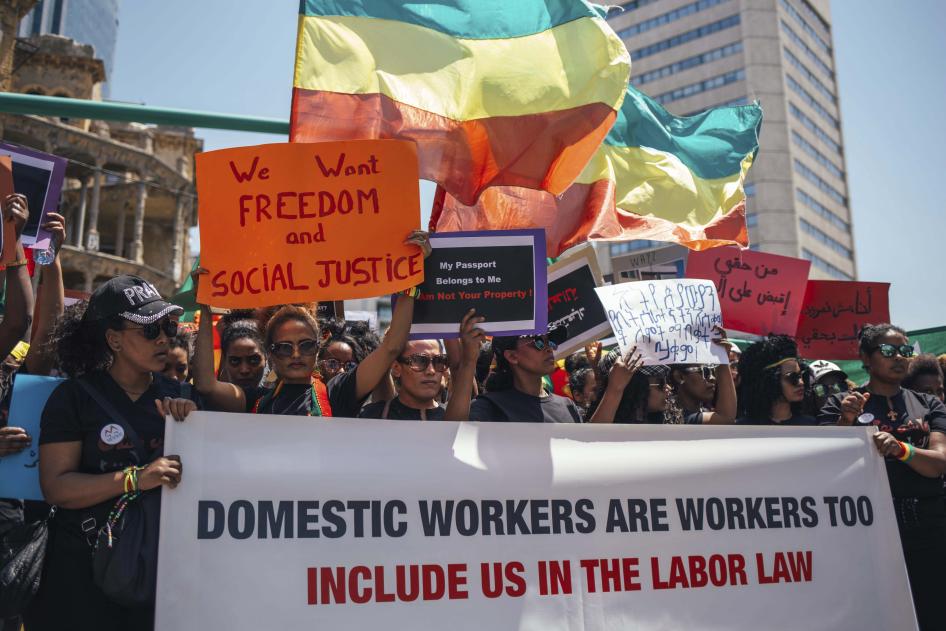(Beirut) – The new standard unified contract for migrant domestic workers that Lebanon’s Labor Ministry adopted on September 4, 2020 is a step in the right direction toward protecting domestic workers’ rights and abolishing the abusive kafala (sponsorship) system if it is accompanied by a stringent enforcement mechanism, Human Rights Watch said today.
The new contract allows workers to terminate their contract without the consent of their employer and provides key labor guarantees already afforded to other workers, such as a 48-hour work week, a weekly rest day, overtime pay, sick pay, annual leave, and the national minimum wage, with some permissible deductions for housing and food.
“If enforced, the new standard unified contract is a win for advancing the rights of migrant domestic workers in Lebanon, as it includes vital safeguards against forced labor,” said Aya Majzoub, Lebanon researcher at Human Rights Watch. “But new protections mean little unless the government publicizes them widely and sets up and rigorously implements ways to enforce them.”
An estimated 250,000 migrant domestic workers, the majority of them women from African and Southeast Asian countries, including Ethiopia, the Philippines, Bangladesh, and Sri Lanka, work in Lebanon. They are excluded from Lebanon’s labor law protections, and their status in the country is regulated by the kafala system – a restrictive immigration regime of laws, regulations, and customary practices which ties migrant workers’ legal residency to their employer.
Human Rights Watch and many other organizations have documented for years how the kafala system gives employers huge control over workers’ lives. This has led to an array of abuses, including non-payment of wages, forced confinement, excessive working hours with no rest days or breaks, and verbal, physical, and sexual abuse. Those who left their employers without “permission” risked losing their legal residency in the country and facing detention and deportation. The previous contract only made exceptions for workers in extreme cases of abuse, with the burden of proof falling on the worker, effectively leaving workers trapped, including in situations of forced labor.
Under the new standard unified contract, workers can terminate without notice if they are subjected to any form of abuse or if the employer does not abide by any of the contract’s provisions. Either party can terminate the contract without notice if there are unforeseen events beyond their control that prevent them from completing the contract period.
Either party can also terminate at will with one month’s notice. However, if either the employer or worker terminates the contract without notice and there is no breach of the contractual provisions, they are required to pay compensation of one month’s salary. The employer may also be able to recoup part of their recruitment costs if the domestic worker terminates the contract before the end of the two-year contract, from either the recruitment agency, in accordance with labor ministry decisions, or from the new employer, worked out on the basis of the total amount of recruitment costs divided by the number of months of the contract, in which the new employer pays the equivalent of the number of months remaining in the contract. Domestic workers should not be made to pay any recruitment costs in any circumstance.
The new contract, if enforced, would finally provide migrant domestic workers in Lebanon many core labor protections that other workers have under the labor law. The new contract recognizes the right of workers to retain their identification documents at all times, to own a phone and communicate freely, and to leave their employers’ homes and move freely during their rest periods. It also protects their right to a healthy and safe working and living environment.
The contract also stipulates that domestic workers are entitled to the national minimum wage, with some permissible deductions for housing and food. The Labor Ministry said in a decision that deductions should not exceed 30 percent of the salary. The Labor Ministry should ensure that the deduction is for the personal use of the worker and their family and that they are fair and reasonable, including ensuring that items directly related to the performance of domestic work are not considered as payment in-kind that can be deducted from their salary, as international labor standards dictate.
“Previously, migrant domestic workers had no clear legal basis to complain about long working hours, low wages, lack of overtime pay and rest, and could get trapped in abusive workplaces with little recourse,” said Majzoub. “This contract – if, and only if, properly enforced – helps fight the conditions that lead to forced labor and servitude.”
The new contract does not allow workers to join and form unions, however. Ensuring the right to freedom of association for domestic workers is vital for strengthening legal protection systems and for combatting rampant abuse. Lebanese authorities should recognize the domestic workers’ union and allow workers to freely join any union of their choice, without negative consequences. They should treat all workers in accordance with international human rights law, which requires them to respect the rights of everyone in their territory to freedom of association, without discrimination.
“Global experience has shown us time and again that workers’ organizations are crucial for spreading information about rights among workers, and supporting them to bring complaints forward to authorities,” Majzoub said. “Supporting freedom of association is essential for turning this contract into changes in domestic workers’ daily lives.”
Labor Minister Lamia Yammine, announced that the new contract will be adopted as of September 21. However, the ministry has not yet disclosed its plans for rolling out the new contract or provided instructions to employers and workers on the procedures for moving to the new contract. The ministry should conduct a public awareness campaign about the new contract provisions and consider mandatory orientation programs for both employers and workers on their legal rights and obligations, Human Rights Watch said.
The ministry should also urgently create an oversight and enforcement system to ensure that employers abide by the contract’s provisions and that employers who violate its provisions are held accountable. The ministry should set clear penalties for common abuses – such as non-payment of wages, forced confinement, excessive work hours, and food deprivation – on a sliding scale of sanctions commensurate with the gravity of the violations. The penalties should serve as effective deterrents to violations and provide redress for workers whose rights are violated.
The ministry also needs to create a complaint system, including fast-track dispute resolution, and ensure that labor inspectors have the authority and training to inspect working conditions. They should be able to enter employers’ homes, with due regard to privacy, and interview domestic workers away from their employers.
The new contract is based on recommendations by a working group established in April 2019 by then-Labor Minister Camille Abousleiman and headed by the International Labour Organization (ILO) to dismantle Lebanon’s kafala system. Human Rights Watch is a member. In June 2019, the working group submitted to the Labor Ministry an action plan with steps to abolish kafala and introduce protections for migrant domestic workers.
Implementing a rights-respecting contract is only the first step toward protecting domestic workers rights and abolishing the kafala system, Human Rights Watch said.
The Lebanese authorities should urgently take other steps to dismantle the kafala system by ensuring that migrant workers are not dependent on their employers for their legal status in the country and amending the labor law to include migrant domestic workers. The authorities should also strengthen the labor ministry’s complaints and enforcement system, outlaw detaining migrant domestic workers for lack of legal residency, regularize the status of undocumented migrant workers, and train security forces and the judiciary to respond to and investigate abuses against migrant domestic workers.
Lebanon is obligated under international human rights law to ensure that domestic workers and migrant workers have protections equal to those for other workers under the law.
“If the labor minister is serious about abolishing the abusive kafala system, she should ensure that the new contract is properly implemented with effective enforcement and move quickly to abolish the kafala system in full so that migrant workers are not left at the mercy of their employers,” Majzoub said. “Migrant domestic workers leave their homes to care for others in Lebanon; they should be treated with the respect and dignity that they deserve.”







